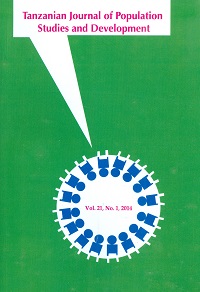Vanilla Production in Bukoba Rural District, Tanzania: Its Impact on the Livelihood of Smallholder Farmers
Abstract
The large price differences offered per kilogramme between vanilla and coffee has tempted farmers to abandon the production of coffee and shift to vanilla production as a way of improving their livelihoods. However, it has not been established if the move is a problem or solution to the livelihoods of smallholder farmers in Bukoba Rural District. It was important, therefore, to carry out an investigation to clear such doubts. Specifically, therefore, this article seeks to determine levels of livelihood outcomes based on assets ownership among smallholder farmers, and compare livelihood outcomes between vanilla and non-vanilla smallholder farmers. The study used a cross-sectional research design, and involved 100 respondents. It employed both qualitative and quantitative methods of data collection and analysis. The wealth index was used to analyse levels of livelihood outcomes between vanilla and nonvanilla smallholder farmers based on income and monetary asset values. Independent T-test was used to compare livelihood outcomes among both groups of farmers. The independent T-test revealed that there was a significant difference in livelihood outcomes (p < 0.001) between these groups. It is concluded that vanilla production is a solution for improved livelihoods of smallholder farmers in the study area. Thus, the government should sensitize smallholder farmers to engage in vanilla production through farmers ' cooperatives because it stands a better chance of improving livelihood outcomes compared to other traditional crops produced in the study area.
Keywords: vanilla, livelihood, smallholder farmers, Tanzania


